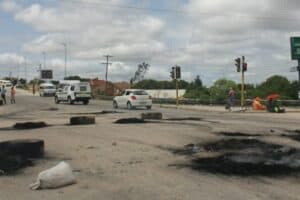Want to join the march but are worried about missing out on work? This is what you need to know…
The South African Police Service and all law enforcement agents will be working double time during the nationwide strike on Wednesday. The South African Federation of Trade Unions (Saftu) and affiliated unions will institute a shutdown of all public transport services around the country in protest against the minimum wage hourly rate.
Rosebank Killarney Gazette reports the general public is advised to be cautious in the main areas of bustling cities where strikes are scheduled and observe safety insofar as possible.
"I am a WORKER and I am PROTECTED for the 25th #SAFTUstrike" pic.twitter.com/CS0ZWItdqK
— SAFTU (@SAFTU_media) April 16, 2018
This strike will affect public trains, taxis and buses. Everyone has the right to join this national strike under South African law. Participants will be walking into central districts of the city centre.
Assemble points and marches on the 25th. No turning back#SAFTUSTRIKE #ScrapNewLabourLaws #Defendtherighttostrike @Numsa_Media @fawu_media @RealDEMAWUSA @DETAWUOO1 @SAPSUpower @NupsawHQ @wearesapu pic.twitter.com/wUa7cU4MO3
— SAFTU (@SAFTU_media) April 23, 2018
No turning back
National shutdown tomorrow
Join the strike and #DefendTheRightToStrike #ScrapNewLabourLaws .@fawu_media @Numsa_Media @RealDEMAWUSA @LivingWageZA @wearesapu @NursesIndaba @NupsawHQ @SAPSUpower #SAFTUSTRIKE pic.twitter.com/qmsrwUslkq— SAFTU (@SAFTU_media) April 24, 2018
Labour law consultant Kaylie Henderson from the human resources and labour law services firm Henderson Butho Consulting has explained the labour laws behind the strike. Here are the 10 things you need to know:
- To participate in the strike, meet on the main roads of your city centre and wear comfortable clothing.
- The strike is under the ‘No Work, No Pay’ principle. If you do not go to work on that day you will not be paid. Take leave where possible or make arrangements in advance with your employer.
- Refrain from using public transport services and any areas/districts routes where public transport services operate.
- Steer clear of business district hubs and major city centres where protesting may take place.
- Do not interfere with anyone who is participating in the strike in any way as this may be dangerous.
- Keep children and pets indoors for safety. They should not be on the streets or travelling during the strike.
- Avoid driving or takings taxi cabs through any affected areas of the strike. The strike may be aggravated by the use of alternate means of transport.
- Truck drivers/deliveries should be on high alert and avoid deliveries to/through any affected areas.
- Businesses must take precautionary measures for the safety of employees and premises.
- The government and law enforcement services will not take responsibility for the safety of the public.






